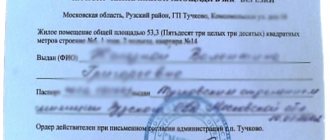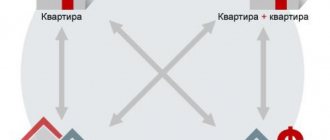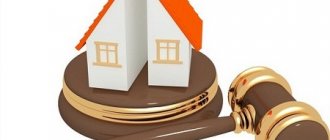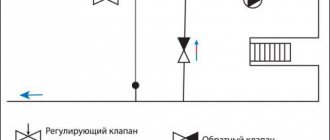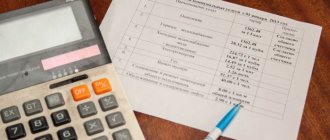Many people want to buy spacious housing. Indeed, living in a small apartment is not so comfortable. Especially if we are talking about a family of several people
.
Meanwhile, before purchasing real estate, professionals recommend weighing the pros and cons
. The fact is that even among three-room apartments there can be a huge difference, which results in a lot of money after the purchase.
On the website https://vartovsk.etagi.com/realty/trehkomnatnye-kvartiry/ you can independently familiarize yourself with the offer for three-room apartments. Below are fair recommendations regarding the subsequent operation of the property. In particular, assessment of fees for housing and communal services.
What will you have to pay after purchasing real estate?
Unfortunately, not everyone thinks about the fact that after purchasing a home they will have to regularly pay for the following expenses:
- repair fee (usually 4% of salary);
- payment for services of the management company;
- payment for major repairs of common premises.
In the case of a one-room apartment, the amount of designated funds will be about 2,000 rubles. The given cost is relevant for housing in new buildings. And we are talking about economy class housing
. For a two-room apartment you will have to pay about 3,000 rubles, but a three-room apartment will cost 5,000 monthly.
It is important to understand that the prices presented are relevant for economy housing. In other words, if you prefer business class or even luxury real estate, then the above figures will have to be multiplied by 3 (in the case of elite properties).
This is exactly what the buyer thinks about for the very last time and begins to bite his elbows after the deal is concluded (usually after the first month of living in the newly purchased property).
Benefits provided
The size of utility bills and rent in Moscow can be significantly reduced by applying for benefits. If the amount of utility bills exceeds 22% of the family's total monthly income, a subsidy is provided. For the poor, the calculation is carried out taking into account an adjustment factor. Russians have the right to find out the procedure for registration and the amount of compensation from the Social Security Administration.
The payment can be reduced by the subsidy issued and the benefits received. Rent rates do not change; the state simply compensates for the cost of some services. Benefits are available to pensioners, Russians with many children, disabled people, single mothers, and war veterans. The amount of compensation can reach up to 50% of the size of the communal apartment.
So, don’t buy comfortable real estate?
Of course, the installed cost is quite considerable. But this does not mean that you should abandon comfortable real estate in favor of secondary, small-sized ones. You can reduce the cost through utilities.
This is achieved in a very simple way. Meters are installed in the apartment for literally everything: water (cold, hot), electricity, gas, heating. The more people are registered in the apartment, the more you can save.
Organizing an HOA in the house will allow you to regulate the prices for repairs.
In addition, do not forget about the grants that are allocated by the city authorities to maintain the communication components of multi-apartment real estate.
The video explains what utility bills consist of:
Today, nothing is rising in price as quickly as rent, but why do we pay it at all, because it is obvious that increasing the rent does not bring any improvement in the quality of housing and communal services - rather, on the contrary, reports “Life in the USSR”
And is the lack of rent a myth or some kind of unheard-of revolutionary innovation? In the period from 1918 to 1922, there were no rents at all in our country. The Bolsheviks, unlike their followers and current advocates of the “market,” correctly understood the theory of economic management. If there is one owner in the state - the state, for which everyone works, including housing and communal services workers, then there is no need for rent
.
Why create additional work for yourself: pay wages, and then take part of it and send it to housing and communal services workers
.
This work is clearly superfluous. Later, such nonsense as taxes appeared, which everyone working in government institutions and enterprises began to pay. In 1922, in connection with the beginning of the New Economic Policy (NEP), the collection of rent was resumed by a resolution of the Council of People's Commissars of the RSFSR dated April 20, 1922 G
.
In the new conditions, rent, in fact, became a forced grimace of the NEP, because in addition to the state, a lot of other owners appeared. Rent was sharply differentiated at that time: NEPmen paid at the highest rate, and many other categories of the population (pensioners, unemployed, etc.) - at minimum rate or were completely exempted from rent. In 1928, by resolution of the Central Executive Committee and Council of People's Commissars of the USSR dated January 4, 1928
.
In the USSR, a unified rent collection system was introduced, which in principle remained until the start of perestroika
.
That is, with the end of the NEP, the system of payment for housing and communal services was abandoned, rather out of inertia, but it was designed for workers and their income. No fees were charged for auxiliary premises (kitchens, corridors, bathrooms, etc.), but for rooms , not meeting the standard conditions, the rent rate decreased. In the USSR, the share of rent in family budgets was very low and decreased over time. In 1931
.
it was 5.8%, and in the 80s it was only 2-3%. Such data show that in the USSR all the material prerequisites for the final abolition of rent were already created. But instead of completely disappearing, after the collapse of the USSR rent increased significantly as a result of the victory of “market” ideology. A relative came the other day and put a piece of paper on the table: “We went through my mother-in-law’s old papers, and here we have it.” Maybe you'll be interested... I looked - a neat rectangle of paper from a notebook in a box. On it with a ballpoint pen:
1. Rent - 2.71 - 2.26 rubles.
2. Heating - 2.08 - 1.54 rubles.
3. Water and sewerage. — 1.28 – 0.64 rub.
4. Light in the basement. - 10 kopecks.
5. Gas - 2.32 - 1.16 rubles.
6. TV antenna - 15 kopecks.
7. Radio point - 50 kopecks.
8. Telephone - 2.50 rubles.
Below is the “Total” – back and forth = two bottles of vodka at Soviet prices.
Below is the “Total” - back and forth = two bottles of vodka at Soviet prices. And sometimes I remember how a few years ago one of my peers got excited and questioned me: - Do you remember how much you paid for the apartment, no? And I don't remember! Do you know why? Yes, we never paid for it, my wife went to the store to buy bread, and at the same time she would pay for the apartment, but what was there to pay?! Kopeks! Sergei Sibiryakov “The Constitution of the USSR enshrines one of the most important human rights - the right to housing. ..Rent in the USSR is on average 1% of the family budget, and together with utility costs - about 4%. This expense item is not increasing.” Olga Shkarupilaya from the Krasnoyarsk Territory has been keeping a diary since 1970, where she writes down the prices of purchases made in the store. Having processed her table, we get, minus the costs of rent and utilities, how many times the standard of living for her family has decreased. How much of a specific product could be bought with the family’s income after paying utilities
As an example: if under socialism a family could purchase 1,145 loaves of bread by paying rent, then this year only 537, i.e. more than two times less
.
The situation with milk and meat is even worse. But to make life seem sweet, sugar is a little cheaper today, by 12%. It can be estimated that, based on the above items, the standard of living has deteriorated by about 3 times. For comparison, imagine a young engineer in the USSR
.
Salary 120 rub. Now divide it by 3, get 40 rubles
.
per month with paid rent. It would be difficult to live on this in the city
.
Even for two people on 80 rubles a month...USSR
.
1985 City of Naberezhnye Chelny. Three bedroom apartment
.
Area 41.3 sq. m. Residents: 5 people
. Total family income: 400 rubles per month. Calculation of rent and utilities. clickable!
Let's see what proportion relative to earnings the rent was in the USSR and compare it with today's proportions. Here are a few answers about how much people paid in the USSR in those very eighties: - Rent along with electricity? Yes, they paid so little, I don’t remember exactly. The family money remained unnoticed. “Our family were rural teachers, and rural teachers were then exempt from rent. We paid for electricity alone, and that at a discount. - The salary was about 300 rubles, the rent was about 5 rubles, I’m talking about 1986. - I paid eight rubles and kopecks, I earned 145 rubles
.
The rent was not a burden on the family. My salary was 349 rubles, I paid from 7 to 12 rubles for a 2-room apartment. Along with electricity. - There wasn’t so much junk in stores and cans on wheels on the streets in the USSR
.
But apartments were allocated to working people free of charge
.
An apartment for a family can handle any junk
.
Young families today cannot get an apartment unless their parents steal and buy it for them. You can’t earn an apartment with honest work. With such rents, workers had money left over to purchase household goods, to travel to relatives throughout the country, to sanatoriums and foreign tour packages. What is five rubles from three hundred? One and a half percent? And for rural teachers - complete exemption from rent? Let's see what happens now. No rent waiver for rural teachers. Their salary is four, five thousand. The rent is three thousand, and sometimes goes beyond four. Pensioners in the city and in the regions. The pension is basically five or six thousand, although there is a lie spread on the Internet that the pension in our country is the lowest - 8 thousand
.
The rent is three and a half, four thousand. How much does it cost to “take it out and give it back”?
- Fifty, sixty percent .
Are apartments really heated fifty times more now?
Do we really all spend fifty percent more on electricity and water? Then why are there such prices for rent? Because those who seized power honestly tried to look us in the eye from all the TVs and lied - the market will regulate . And they lied - we are obliged to pay, pay, pay, more and more. The heat generated at the former national thermal power plants became private with the disconnection from the state. And water. And electricity. And private owners turned out to have the most greedy interests, aimed only at snatching as much money as possible from any person...
News @ inform - We are on VKontakte
How to help the site "Rusichi"
Utility prices rise periodically. Thus, from April 1, 2021, utility rents have increased again in Russia
. Russians on average spend more than 16% of their total family income on utility bills.
The average salary is 35,000 rubles; when living in a three-room apartment, the average salary is about 5-6 thousand rubles. per month. And in winter the fee increases.
For gas, citizens of the Russian Federation pay about 4 rubles per 1 cubic meter, for water – 28-30 rubles.
general information
Is there a dependence of the size of the rent and payment for the use of services on the number of people registered in the apartment ?
Yes, there is such a dependence, and it is directly proportional to the number of people registered in the living space of a particular apartment.
In Art. 2 of Law of the Russian Federation No. 5242-I directly states that you need to live where you are registered, otherwise this registration will be called fictitious.
Regardless of whether citizens live, where they are registered - it does not matter, temporarily or permanently, all payments will be accrued .
Read about the features of registration in privatized, communal, mortgage and municipal apartments in our articles.
Obligation to pay utility bills
Housing legislation determines the tenant's obligation to pay utility bills monthly.
Article 153 of the Housing Code of the Russian Federation determines that a citizen must pay fees for housing and communal services on time, no later than the 10th day of the month following the previous one.
Civil law also establishes the obligation to pay for housing, unless otherwise specified in the contract. This obligation must also be specified in the social tenancy agreement (Article 672, Article 678 of the Civil Code of the Russian Federation).
If you fail to pay housing and communal services, a penalty will be charged on the amount of the debt for each day of delay.
The debt can be paid either in full or in part. However, if partial payment is made, the debt remains, and penalties will continue to accrue on this balance. A citizen can pay the amount in advance for the next month.
If you have temporary difficulties, then you can contact the following authorities and ask for a deferment or installment plan to pay utility bills:
- to the owner of the apartment;
- to the landlord;
- to the managing organization.
By paying utility bills in full, you pay for cold and hot water, electricity, heating, gas.
If you have not been in the apartment for some time, thereby not using the services, the payment for which is calculated not by the tariff, but by the standard, in this case you can pay for the service, taking into account the recalculation for the time of your absence (Article 155 of the Housing Code of the Russian Federation).
Payment can be made in cash or by non-cash means. There are enough payment methods today:
- at the bank's cash desk;
- via terminal;
- via the Internet;
- by phone.
Utility bills must be paid by:
- tenants from the moment of conclusion of the contract;
- tenants of state or municipal housing;
- council housing tenants;
- members of a housing cooperative;
- apartment owners after receiving a certificate of ownership.
Before citizens move into an apartment, the responsibility for paying for utilities falls on state and municipal authorities.
The basis for starting to pay for utility services is the agreement, which comes into force after its conclusion. After this, the parties have rights and obligations (Article 425 of the Civil Code of the Russian Federation).
The state provides
rent subsidies in 2018
year to certain categories of citizens.
Do you need a sample certificate of no rent arrears? See here.
Approximately how much does a utility bill cost in a 1-room apartment?
Payment for housing and utilities The amount of rent is determined during a meeting of property owners, if they have previously officially registered their own cooperative or co-owners' partnership.
If there is no decision made, then the exact rent rates will be set by regional authorities or relevant municipal authorities. Calculation of the amount and benefits In order to determine the exact amount of payment for utility services, you need to conduct a full cost calculation
. Standard utility bills include:
- rent.
- sewerage;
- warm;
- gas;
- hot and cold water;
- electricity;
In the vast majority of cases, payment for utility services is carried out based on the indicators of meters installed inside
What is the rent for a three-room apartment?
In large cities, as a rule, in addition to basic utilities, there are also additional services. Therefore, having decided to move, you first need to figure out how much you will have to pay for a three-room apartment.
The average size
In Moscow, when living in a three-room apartment with a total area of 60 sq.m., the cost of utilities costs 2-3 thousand rubles.
If the house is worn out by more than 60%, or if the house is in disrepair, then rent will not be charged in this case.
In St. Petersburg, utilities in a three-room apartment are an order of magnitude higher, and cost citizens 7,000 rubles, and it will cost 1,500 rubles to pay for electricity alone.
What is included?
The total cost of utilities consists of payment for the apartment itself, as well as for electricity, water, gas and heating. Utilities also note that major home repairs may soon become another paid service.
The rent for the apartment should not be lower than it was set by the utility company, but it can be higher based on the HOA agreement.
The amount for the apartment will be based on the total area of your apartment, the tariff is multiplied by the square footage. This causes the price to rise accordingly.
Do not forget that for some services an additional fee may be charged, for example, garbage removal is paid for each person registered in the apartment.
As for paying for electricity and water, not everyone here has meters, so payment is made:
- according to the meter readings;
- at established rates per person.
These payments are also supplemented by general house needs, which are calculated according to the common house meter or according to the established tariff, multiplied by the area of the housing.
Heating is calculated according to the tariff, taking into account the area of the apartment. However, there are also some nuances here if you have your own heating or have chosen a different method of heating your apartment or house.
Rates
According to the latest tariff changes in 2021, citizens will pay the following amounts:
| Name of service | Rate |
| heating | 1400 rub/1 Gcal |
| hot water | 26.50 rub/m3 |
| electricity | single-rate tariff – 3.5 rub/kW daily tariff – 3.55 rub/kW
|
| electricity for houses that have electric stoves installed | single-rate tariff – 2.5 rub/kW daily tariff – 2.5 rub/kW night tariff – 1.5 rub/kW |
| cold water | 21 rub/m3 |
| gas | 5.40 rub/m3 |
| drainage | 21 rub/m3 |
Subsidies
Both “utilities” and rent, with the observed constant increase in tariffs, are becoming unaffordable for some segments of the population. There is a social
.
program to support the poor
.
When subsidies are provided, expenses are reimbursed. The rules are regulated by Government Decree No. 761 of 2022
. The purpose of these measures is to resolve housing problems.
If a person’s income is less than the subsistence level, a coefficient is applied that reduces the maximum amount of housing payment. This figure is set differently for regions, taking into account factors:
- remoteness;
- local conditions;
- consumer basket.
The state assists citizens for whom rent becomes unaffordable relative to expenses. To apply for a subsidy, a citizen must visit the social protection office in his locality
. If an individual (or citizens)’ housing and services associated with it amount to more than 22% of their income, such assistance is assigned.
Calculation of payments for housing and communal services
In 2012, a new receipt for paying utility bills was introduced, which contained more detailed information. So, it included all payments for each service - water, electricity, heating and gas), they were divided into two parts - the first included personal consumption of services according to meters, and the second - according to public meters.
Now it is easier to understand how the amount is calculated between all city residents for heating the entrance or for night lighting.
Also, the new payment order specified all established standards for each service. Now, in order to check whether the rent amount was calculated correctly, you don’t need to look for what the standards are and how to calculate them.
In addition, the utility company must monitor the building's meters on a monthly basis, which was not always done in the past.
The new receipt now allows you to pay utility bills in installments, which is very convenient if you owe money.
Thus, in order to figure out how much you need to pay for an apartment and determine whether you have debts, you need to know exactly what the standards and tariffs are for each service and remember that the price may depend on the region in which you live.
In general, payment for a three-room apartment will cost between 3-4 thousand rubles.
Therefore, before you buy or rent an apartment, ask how much the owner paid for it and whether your budget will allow it.
However, if your apartment bills are unbearable, remember that the state can help you - you can apply for a subsidy for this. This financial assistance is available only to vulnerable segments of the population or citizens who spend more than 22% of their total income on paying for utilities.
Rates
Tariffs for services and housing are set by local governments and state authorities. Standards from legislation are taken as a basis
.
Regions can introduce their own tariffs for making payments by citizens
. In some areas, social status is taken into account. There are benefits to help the poor and other categories in need:
- disabled people;
- minor orphans;
- pensioners;
- unemployed;
- persons with incomes less than 50% of the subsistence level.
Regulatory and legal acts are regulated by the Ministry of Construction and Housing and Communal Services. The same department sets tariffs based on average values.
Special cases
It happens that people bought an apartment for a growing child, or it was inherited, and while no one lives , the question arises: what to do with the receipts?
If no one is registered
I am the owner of the apartment but am not registered there. What to do?
To reduce payments to a minimum , you need to spend one time on metering devices for all energy carriers: gas, electricity, water.
In this case, if no one lives, the actual expense will be zero and you will not have to pay.
There is another significant line in the receipts: heating fees. What will the rent be?
If there is no meter , then there is no escape from the bills. You should consider whether it is worth spending money on expensive thermal energy flow meters. If the home has been empty for a long time, then the answer is clear: it’s worth it.
Registered, but no one lives
If a person is registered at the address, but actually lives in another place , then bills will be sent to him. To pay only for those who are actually in this living space, you should:
- take a certificate from the location of a person who does not live here stating that he lives and pays for his presence there;
- Based on this certificate, write applications to the residents. office and to each of the organizations providing services.
Will the rent calculation change?
Invoices will begin to arrive corrected, but you will have to bring such a certificate and repeat the entire procedure with each service provider every 6 months to confirm the absence of a person registered at this address at the place of residence.
In accordance with the Rules for the provision of public utility services (Part VIII, clauses 86, 87), the fee must be reduced .
How to force someone to pay?
There are three ways to force those registered in an apartment to pay for the use of it and all the benefits of civilization:
- separate personal accounts;
- threaten to terminate registration;
- sue.
The first way is suitable if the question concerns relatives . The other two are real in the fight against tenants
. The fact is that the owner can at any time unilaterally stop accounting activities regarding anyone whom he has sheltered.
How to force registered persons to pay rent?
The court, by its decision on the basis of Part 2 of Art. 61 of the Code of Civil Procedure of the Russian Federation recognizes tenants as having lost their rights and will oblige them to pay the funds, but they will only have to prove by providing paid receipts signed by themselves that for a certain period of time the rent and utilities were paid by the owner, but not by registered persons.
Only strangers can be forcibly removed from an apartment, and the apartment must be privatized .
Before you try to make money by registering guests, temporarily or permanently, you should first calculate how rent and utility bills will change, and also develop a payment system so as not to lose out .
Installing meters will help optimize consumption, and also use it as a lever to save resources.
Moscow
| Service | Chertanovo South, Varshavskoe highway |
| Ryazan district, microdistrict. "Volzhsko-Oksky" | Teply Stan, st. Ak. Vinogradova |
|
| Maintenance and repair of housing (RUB/sq. m) | 25,05 | 25,05 | 25,05 | 27,6 | 38,5 |
| Heating (rub / Gcal) | 1742,92 | 2195,61 | 2 199,24 | 2 195,61 | 1 938,07 |
| Hol. Water supply (rub/cubic m) | 35,4 | 35,4 | 35,4 | 35,4 | 36,64 |
| Gor. Water supply (rub/cubic m) | 180,55 | 172,41 | 180,55 | 172,41 | 168,32 |
| Water disposal (rub / cubic m) | 25,12 | 25,12 | 25,12 | 25,12 | 44 |
| (Video) intercom (rub / piece) | — | 64 | 75 | 64 | — |
